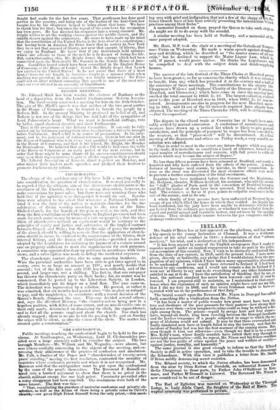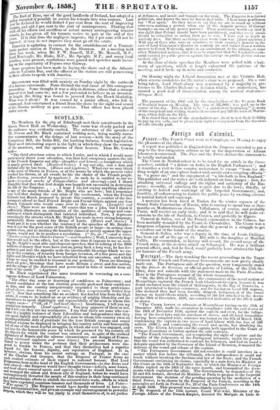IRELAND.
Mr. Smith O'Brien has at last appeared on the platform, and has made a big speech to the young Irelanders at Clonmel. It was a deliberate defence of his rebel conduct in 1848; a denunciation of that "solemn mockery," his trial, and a declaration of his independence.
" It has been argued by some of the English newspapers that I ought to consider myself under an implied engagement to take no part in the politi- cal movements of this country: Now, I wish to be distinctly understood that from the time of my capture, in 1848, until the present hour, I have never given, directly or indirectly, any pledge that I would abstain from the pro- pagation of my opinions, which I have taken many opportunities ofavowing to be unchanged. I never would have returned to Ireland if I had been fettered by any conditions, and I would not remain a day in Ireland if I were not at liberty to say and to do everything that any other Irishman is entitled to say or to do. I have the satisfaction of thinking that by me, at least, the national standard has never been lowered—nor will it ever be lowered. I am prepared still to maintain, as I maintained in that court- house when the expression of such an opinion might have cost me my life, that I did my duty in 1848, and that every Irishman ought to have co- operated with me in the performance of that duty." The brutal assault upon the Reverend Mr. Nixon in Donegal has called forth something like a vindication from the Nation. "It has been a matter of public wonder how great must have been the love and obedience of the poor peasants for their pastors—how strong their influence over them—when tempters to crime could so long be without a dis- ciple among them. The priests—repaid by savage hate and foul abuse— have, beyond all doubt, long been standing between the Donegal landlords and the lawless vengeance of a people subjected to usage to which the ne- groes of Alabama would not submit. It may be that these overworked and foully slandered men have at length failed to stay the torrent, and that the incident of Sunday last was but the first murmur of the coming storm. But, even though it turn out otherwise—even though we find it to be a second Mrs. Kelly's ease, where family scandals have rotted their way through to downright assassination—still, we repeat, Mr. Nixon and his fellow-worthies are not the less guilty of crime against the peace and welfare of society— against justice, morality, and humanity." The same journal is also good enough to inform us that the Riband Society is still in active operation, and to take the trouble to discourage the Ribandmen. With this view it publishes a letter from Mr. Smith O'Brien mildly denouncing secret societies. The Riband society, to which the Nation alludes, has been denounced from the altar by Dean Keiran of Dundalk, an influential Roman Ca- tholic Clergyman in those parts, by Father John O'Sullivan in Ken- mare, and 'Father M‘Donnell in Listowel. The Reverend Mr. Nixon is now considered to be out of danger.
The Earl of Eglinton was married on Wednesday at the 'Viceregal Lodge, to Lady Adds Capel, the daughter of the Earl of Essex. The nuptial ceremony was performed in private. .;
it ' ' '
The Earl of Erne, one of the good landlords of Ireland, has adopted a „ace, intended if possible to coerce his tenants into wise courses. Last year he declared he would deduct 5 per cent from the rent of improving ingers, and add 5 per cent to the rent of nonimprovers. Finding that Kith all his efforts and sacrifices of actual money nonimproving tenants reamle, be has given, all his tenants notice to quit at the end of five years. Ifin that time the negligent improve, the 5 per cent will not be imposed ; they do not improve they must go off the estate. Limerick is agitating in earnest for the establishment of a Transat- lantic packet station at Foynes, in the Shannon. At a meeting held there last week, when Mr. F. W. Russell, M.P., Mr. Monsen, M.P., Lord Monteagle, Mr. Blake, M.P., Mr. Speight, M.P., and many local notables, were present, resolutions were passed and speeches mado insist- ing on the superiority of Foynes over Galway.
Some progress has been made in laying the shore end of the Atlantic cable in Valentia Bay, and the officers at the station are still persevering in their efforts to speak with America.
. Queenstown was filled with anxiety on Sunday night by the outbreak of a furious cannonade. None divined the real cause of this outrageous proceeding. Some thought it was a ship in distress, others that a strange man-of-war had come in ; not a few pretended to believe in an invasion. At length the firing was found to proceed from the Hawk blockship. What was it about? It was caused by a junior officer, who left in command, had entertained a friend from the shore by the sight and sound of the Marine artillery at gun exercise. That officer has been placed under arrest.



































 Previous page
Previous page